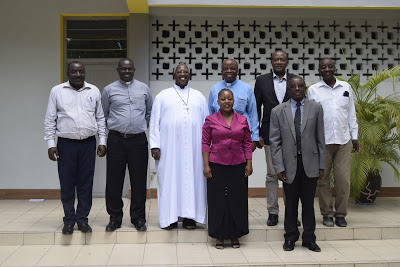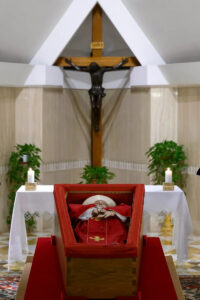TANZANIA: Caritas representatives Meet In Tanzania

The management team of Caritas Internationalis, Africa, AMECEA and Tanzania in a group photo with Chairperson of Caritas Department (TEC), Archbishop Jude Thaddaus Ruwa'ichi, shortly after finishing the meeting (photos by Dalphina Rubyema)
As employees of the Catholic Charities Association (Caritas) met to evaluate themselves to see if their activities and performance carry their identity, they have asked Catholic Bishops in Tanzania to consider Caritas as their own wing of community service and ensure close monitoring of the association.
The Assistant Executive Secretary of Caritas Internationalis in Rome, Msgr. Pierre Cibambo, made this request during a meeting between the Caritas delegation when they visited the Chairman of Caritas-Tanzania Department, Archbishop Jude Thaddaus Ruwa’ichi in Dar es Salaam earlier in the week.
Msgr. Pierre, accompanied by the Caritas General Secretaries in Africa, the AMECEA Integral Human Development Coordinator and representatives of Caritas-Tanzania at the national level, said since its inception Caritas is a bishops’ organization whose mission is to perform acts of compassion for various groups within the community especially the poor, so to fulfill the Church’s obligations. As such, Caritas must receive cooperation from the local Church leaders
“Caritas – Tanzania is a mirror of all the bishops under TEC and the Church of Tanzania as a whole. It’s well-being is also a great image for its council in which bishops have played a special role since the establishment of this charitable organization,” he said.
Msgr. Pierre further said that the closeness of the bishops to Caritas will make Caritas’s staff to perform their duties with high responsibility, recognizing that there is an entity in charge to them.
“If you find yourself in trouble and you don’t have someone to supervise you, you certainly cannot go far since the executioner will be yourself,” he said.
However, Monsignor Pierre said, in their research in various parts of the world, they found that there are some countries where Caritas works like an NGOs, where its practitioners are more concerned with their salaries and other entitlements, thus losing the identity of their establishment as a tool for the Church to spread love and perform acts of compassion for the poor.
“Caritas is not supposed to do its job as competitively as some NGOs, but the implementation of its responsibilities must be in line with the Church’s mission of serving both physical and spiritual and in particular the issue of peace building, humanitarian relief and disaster relief. and other ministries, thus fulfilling the obligation of Church leaders to be the voice of the voiceless,” he stressed.
He called upon all Caritas staff to recognize the performance of their duties under the bishops at national or diocesan levels, with transparency and accountability manners.
“Priests and monks also should be involved so that they can recognize Caritas and its activities. This is also good for teaching believers at all levels from Small Christian Communities, to do charitable acts,” he stressed.
He added that even the Europeans who give aid are not wealthy but ordinary people who love God and humanity. He further called upon the Caritas National Office to continue to fulfill their role of coordinating provincial functions and managing projects funded by Caritas Internationalis, rather than implementing the projects directly.
He has also expressed gratitude to the Secretary General of the Tanzania Episcopal Conference (TEC), Rev. Dr Charles Kitima, who shows an understanding of Caritas’ objectives. The Secretary-General promised that in his plans, TEC would keep among its priorities to enable Caritas to carry out its activities as intended.
Caritas-Tanzania Chairperson, Archbishop Jude Thaddaus Ruwa’ichi said the Church of Tanzania appreciates the good work of the organization and that if there are shortcomings, they will be discussed at various bishops’ sessions so that they may be addressed, thus promoting social welfare for the benefit of the community, the Church and the nation at large.
“TEC bishops recognize and value Caritas as our tool for serving the community, of course, there are challenges, but these are some things that must be addressed continuously. Other issues will be discussed at various bishops’ meetings,” he said.
The Executive Secretary for Caritas-Africa, Mr. Albert Mashika, called upon Caritas Tanzania to have a strategic plan aimed at implementing its various social activities in line with those of Caritas Africa which are to be implemented between 2019-2023.
“In your strategy you must also have priorities and work on them on time,” he said.
The AMECEA Integral Human Development Coordinator Rev. Fr Paul Igweta on his part said that as a Church entity, Caritas ‘activities depend on each other, so Caritas’ success in Tanzania is not only the success of TEC, but also the success of AMECEA, Caritas Africa and even Caritas Internationalis, therefore called for cooperation to achieve this goal.
The team from Caritas Internationalis, Caritas Africa and AMECEA met with with the management of Caritas Tanzania to exchange ideas and practical experience, as well as to appreciate Caritas Tanzania’s development and its challenges and find the way forward.
By Dalphina Rubyema


